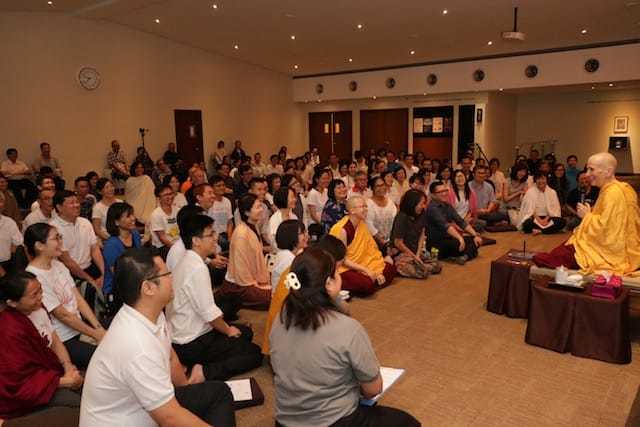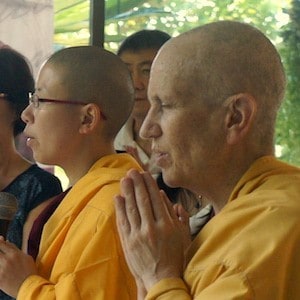Ethical conduct review
Ethical conduct review
The text turns to training the mind on the stages of the path of advanced level practitioners. Part of a series of teachings on the Gomchen Lamrim by Gomchen Ngawang Drakpa. Visit Gomchen Lamrim Study Guide for a full list of contemplation points for the series.
- Ethics as it relates to the law of karma and its effects
- Wrong views in the modern world
- Guarding against maliciousness and covetousness
- Idle verbal and non-verbal communication as well as harsh speech
- The benefits of practicing far-reaching ethical conduct
Gomchen Lamrim 116: Ethical Conduct Review (download)
Contemplation points
- Reflect on the last 5 destructive pathways of action with regard to how they manifest in the world today:
- Wrong views: What kinds of wrong views are referred to in this pathway of non-virtue? Consider: Do we as a society have more opportunity to find and cultivate wrong views today than we did at the Buddha’s time? What kinds of wrong views do you see in the world today? In your own life (can be past or present)? What are some of the results you’ve seen from wrong views, both in the world and in your life? What can you do, what antidotes can you apply, to counter wrong views in your life?
- Malice: Where do you see malice in the world? Under what conditions do you see it come up in your own mind? What are the disadvantages of malice in your own life? In the world? How can you, as a practitioner, guard yourself against malicious thought?
- Covetousness: Where do you see covetousness operate in the world today? Under what conditions do you see it operate in your own life? What are the disadvantages of covetousness in your own life? In the world? What tools does the Buddha provide to counter the mind of covetousness?
- Idle Talk: Where do you see idle talk in the world today? Where do you struggle with it in your own life? What harm does idle talk cause in the world? In your life? What can you do to begin to counter idle talk in your own life?
- Harsh Speech: What forms of harsh speech do you see in the world today? In your own life? What are the results of harsh speech? What harm do you see in the world and in your life as a result of harsh speech? What can you do to counter harsh speech?
- What does keeping good ethical conduct mean? What is far-reaching ethical conduct?
- What are some of the benefits of practicing far-reaching ethical conduct?
- How does ethical conduct help to establish trust in relationships?
- What does it mean to be living in “degenerate times?” Are we living in one or is there more kindness in the world than ever?
- What happens when someone tries to legislate their version of ethics? How do we balance our own ethical code with outreach (volunteering, political activism, etc), considering the wide range of religion traditions in society?
- Should anyone have the right or moral obligation to censor harsh or divisive speech either in public or on the internet?
- How does living an ethical life help you in this life? How does it impact the people with whom you come into contact?
- Seeing the disadvantages of non-virtue and the many benefits of keeping good ethical conduct, resolve to abandon negativity and cultivate the actions of body, speech, and mind that create peace and harmony in your life and in the world.
Venerable Thubten Tsultrim
Inspired by Kwan Yin, Chinese expression of the Buddha Compassion, Ven. Thubten Tsultrim began to explore Buddhism in 2009. As she learned that "real people like me" aspired to become awakened like Kwan Yin, she began to explore the potential to becoming a monastic, which led her to Sravasti Abbey. She first visited the Abbey in May, 2011. Ven. Tsultrim took refuge and joined the 2011 Exploring Monastic Life program, which inspired her to remain at Sravasti Abbey where she continues to learn and grow in the Dharma. The future Ven. Tsultrim took anagarika ordination in October of that year. On September 6, 2012, she received both the novice and training ordinations (sramanerika and siksamana) and became Ven. Thubten Tsultrim ("Ethical Conduct of the Buddha's Doctrine"). Ven. Tsultrim was born in New England and spent 20 years in the U.S. Navy. She began her career doing maintenance on aircraft, then worked as an Air Traffic Controller before retiring as a Damage Control Chief Petty Officer. She has also worked as a staff member at a residential treatment center for teenage girls. At the Abbey, she is responsible for maintaining the buildings and provides support for the abundant audio teachings that the Abbey generates and shares.


